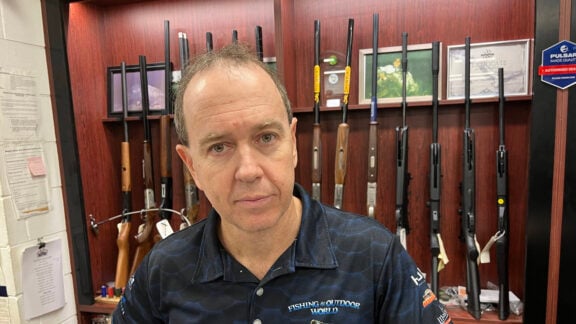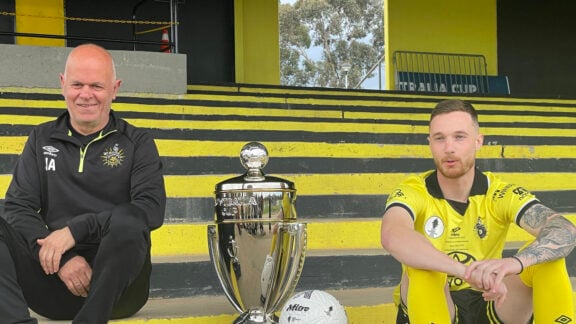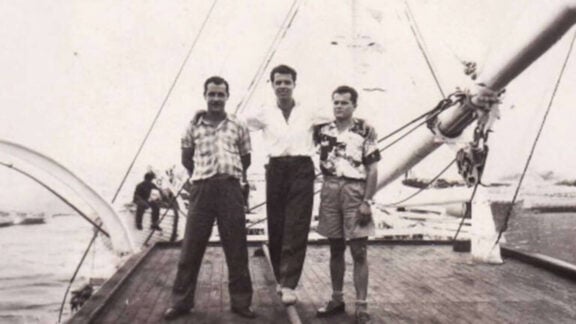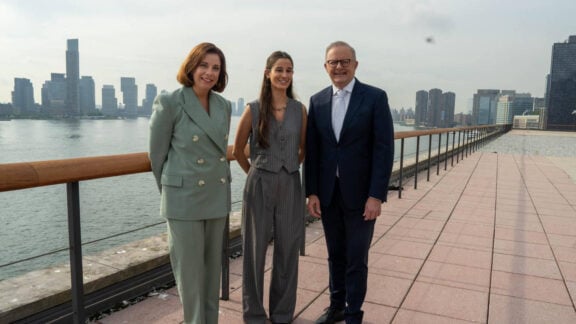The ensemble that George Doukas has put together for Sunday’s show has a distinctly international flavour. The string quartet features three Greek Australians, including Chloe Ellis, the daughter of world renowned conductor George Ellis, a cellist from Miami, while the trumpet player hails from Azerbaijan.
Doukas says the idea behind combining rembetika and strings was purely about challenging his own ideas behind Greek music.
“Every so often I come up with different crazy ideas,” he says.
“A few years ago, I had a band called Balkano which was a fusion of Greek and Balkan Gypsy stuff. It had a big sound and was very vibrant. Then I had a rembetika ensemble with authentic instruments. It included the tzoura, the baglamas, an oud, a six-string bouzouki, a violin, and no keyboards. There was nothing electric and it was [a] really nice sound.
“But everyone does rembetika and after a while I didn’t want to do what everyone else was doing. I wanted to set the trends, I don’t want to follow the trends. So, I was listening to a string quartet one day and I thought wouldn’t that sound great with Greek arrangements?”
In preparation for this week’s show, George Doukas and the D Strings have been performing their unique music in smaller venues around Sydney, being predominantly a string quartet featuring Doukas, a piano, a bass player and another singer. Since then, Doukas has added a bouzouki and a percussionist turning each gig into a big sound.
“We’ve been kicking ass,” he says. But speaking to Neos Kosmos ahead of the performance at the Factory Theatre, which is a much larger venue, Doukas was a mixture of nerves and excitement.
“‘I’m really nervous about this performance because I’ve never mixed a quartet and trumpet together, I’m sh***ing myself.”
Understandably, as the Greek Festival of Sydney is in its 36th year and is regarded as the biggest multicultural festival in Australia. Being part of the 16-week program fills Doukas with Hellenic pride.
“I don’t do it because the festival allows me to sell more tickets and I play at a larger venue,” he explains.
“I do it because you are doing something for the community and contributing to a cultural event. I like that I can bring a different kind of music to people that is still within the Greek culture but with different influences.
“That’s important because the kids coming through now have an opportunity to hear these songs played in a slightly different way without losing the core strength of each of these songs.
“When I first told people that I was putting rembetika with a string quartet everyone said it can’t be done. But now it’s worth it when you see the expression on people’s faces and they go, ‘wow! I didn’t expect this.’ Under my breath I say, ‘neither did I, but don’t worry.'”
Doukas says Sunday night’s performance will include traditional songs that will be very familiar to fans of Greek music.
“I really love the old smyrnaiko sound and some of the old rembetika stuff and to hear that played with strings is really something different,” he says.
“Examples are Ta Paidia tis Geitonias (The Children of the Neighbourhood), Stou Thoma to Magazi (At Thomas’ Place), Dimitroula Mou (My Dimitroula), O Boufetzis (The Barman), and Akrogialies (Seashores). Those songs just seem to work.
“That’s an example of some of the smyrnaika that we’re doing. Then you’ve got some of the other stuff on the program and some Nisiotika. An example would be Ta Kavourakia (The Little Crabs) and I am also going to do a couple of Serbian pieces.”
For Doukas, the largest obstacle he has found combining a string quartet with the traditional Greek classics was getting the feel right.
“The hardest part of doing the arrangements is not over-arranging these old songs because you lose the beauty that they have,” he says stressing that the string quartet won’t be there just for the background but will feature prominently in the mix.
“A lot of these songs are simple songs and if you make them really complex then you kind of lose that inherent beauty. What these classical instruments add to Greek music is it gives it a depth that you don’t often hear and certainly you don’t often feel. When you’ve got the cello hitting those long notes and the viola sitting just above the cello then you have the bass it goes through your body. Greek music lends itself to that.”
Doukas also explained the idea of combining the two styles of music isn’t about making the sound contemporary, rather the performers involved make it more akin to world music.
“It gives it an international feel rather than a modern feel,” he says.
“You are combining traditional instruments with classical instruments so all of a sudden it’s not just a Greek thing it’s a music thing; something that everyone can listen to.
“What I hope the audience take away is an appreciation of the richness of Greek music and how it can combine with a whole other style of music,” he says.
“I really want people to leave the theatre saying ‘wow, we never knew that Greek music can sound like this. We never knew that some of those traditional songs could sound so rich’. That’s what I want them to walk around saying.”
George Doukas and D Strings perform on Sunday 25 February at Sydney’s Factory Theatre (105 Victoria Rd, Marrickville NSW) at 7:30 pm.








